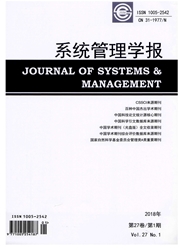

 中文摘要:
中文摘要:
考虑由理性的制造商和过度自信的销售商所构成的供应链,研究制造商如何进行产品的生产决策及定价,并设计合适的激励机制来激励销售商努力工作。针对这一问题,提出委托代理模型并从理论上分析了销售商的过度自信程度对其努力程度,制造商的最优期望利润、生产和价格决策以及最优激励合同的影响,进而与销售商完全理性的情形进行了对比。研究发现,随着销售商过度自信程度的增加,销售商的努力程度、制造商的最优生产和价格决策以及期望利润会越来越偏离理性时的情形。最后,通过算例对结论进行了分析验证。
 英文摘要:
英文摘要:
Aiming at the supply chain with a rational manufacturer and an overconfident sales-agent, we investigate how the manufacturer makes the pricing and production decisions simultaneously and provides incentives to the sales agent so that the agent works hard to sell the product. We develop the principal- agent model and analyze the impact of the sales-agent' s overconfidence level on its optimal effort, the manufacturer's expected profit, the pricing and production decisions and the incentive contract. We then compare the results to the rational scenario. It is found that, as the overconfidence level increases, the sales-agent's effort level, the manufacturer's pricing and production decisions, the corresponding expected profit deviate far away from the rational scenario. A numerical example is provided to demonstrate the validity of the proposed model and the analysis.
 同期刊论文项目
同期刊论文项目
 同项目期刊论文
同项目期刊论文
 期刊信息
期刊信息
